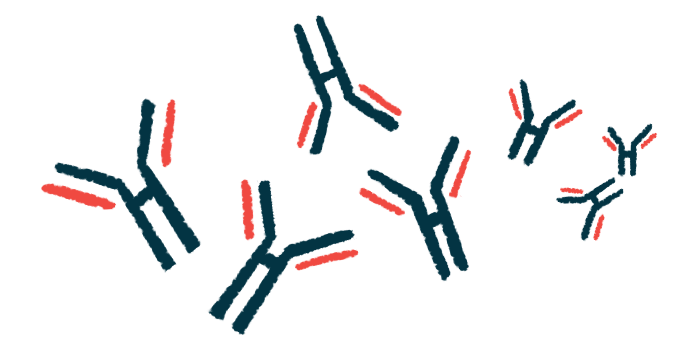Despite AIHA alloantibodies, transfusions generally safe, effective
Nearly 20% of patients needing blood transfusion had antibodies against donor blood

Nearly 20% of people with autoimmune hemolytic anemia (AIHA), including cold agglutinin disease (CAD), who required blood transfusions developed antibodies against proteins in donor blood that could compromise a transfusion’s safety or effectiveness, a study shows.
These antibodies, called alloantibodies, were associated with a higher transfusion burden, lower efficacy, and adverse reactions. Still, blood transfusions were found to be generally effective and safe in patients with alloantibodies.
Also, the rate of patients who developed alloantibodies has decreased recently, which researchers attribute to pre-transfusion practices implemented to lower the risk of such immune reactions.
“Severe symptomatic AIHA may be safely transfused provided appropriate matching of patients and donors,” the researchers wrote in “Transfusions in autoimmune hemolytic anemias: Frequency and clinical significance of alloimmunization,” which was published in the Journal of Internal Medicine.
AIHA encompasses a group of diseases wherein the immune system mistakenly attacks and destroys red blood cells (RBCs). CAD is a type of AIHA where self-reactive antibodies called cold agglutinins attack RBCs at cold temperatures.
Patients with all AIHA types may have severe and life-threatening anemia where there is a lack of red blood cells to carry oxygen through the body. Patients with severe disease often depend on blood transfusions from healthy donors.
Results of blood transfusions in AIHA patients
Testing before a transfusion can help make sure the donor blood is compatible with the patient’s immune system. If it’s not, the patient’s immune system may react against proteins in blood it doesn’t recognize — a process called alloimmunization — that can compromise a transfusion’s safety and effectiveness.
AIHA can complicate this testing because self-reactive disease-causing antibodies may mask the presence of existing alloantibodies that indicate the possibility of a reaction.
“The evolution of blood selection strategies over the last few decades may have improved transfusion outcomes in AIHA, although systematic data are lacking,” wrote researchers in Italy who analyzed data from 305 AIHA patients (164 females, 141 males) who were followed at a center in Milan, Italy between 1997 and 2021 to examine how often alloimmunization occurs with blood transfusions and its clinical impact. The patients’ median age was 62 (range, 2-94). Nearly a third of them (31%) had CAD.
The analysis included a median of nearly six years of retrospective follow-up as well as a median of about two years of active, prospective follow-up within an observational study (NCT05931718).
Throughout the follow-up, 103 patients (33%) required blood transfusions.
Median levels of hemoglobin — the protein in red blood cells that carries oxygen — increased by 1.2 grams per deciliter (g/dL) after a transfusion, reflecting an easing of anemia. The overall transfusion response rate was 83% (85 patients).
Eight people (7%) had fevers after their transfusion, but they didn’t involve RBC destruction and were resolved with standard anti-fever medication.
Alloantibodies were detected in 19% of the transfused patients and 12% of the nontransfused patients. The antibodies’ presence in those who hadn’t had a transfusion could be due to pregnancy or missing retrospective transfusion data, the researchers said.
“Patients with or without alloantibodies had similar gender, age, and AIHA type distribution, as well as pre-transfusion [hemoglobin] levels,” they wrote.
Those with the antibodies in the transfusion group exhibited a significantly higher transfusion burden than those without them, meaning they required more units of RBCs during the transfusion (median, 10 vs. 3 units).
Alloimmunization was also associated with a lower median increase in hemoglobin levels after the transfusion (0.9 vs. 1.5 g/dL). This stunted increase in hemoglobin was significant only in patients who received a transfusion before 2010.
Patients with alloantibodies also showed a significantly higher rate of transfusion reactions (20% vs. 4%) and more relapses (median, 2 vs. 1). No significant differences were observed between AIHA subtypes.
Rates of blood transfusions decreased from 43-53% between 2000 and 2015 to about 20% between 2016-2022.
The rate of alloimmunization also steadily decreased from about 30% in earlier years (2000-2010) to 6% more recently (2021-2022). Moreover, no transfusion reactions were observed in the recent, observational part of the study.
The findings “indicated a progressive decrease in transfusion frequency and in the rate of alloimmunization and febrile reaction,” wrote the researchers, who said the reductions may reflect new pre-transfusion practices being implemented — more thorough molecular analyses of patient and donor blood, removal of potentially reaction-provoking components from donor blood, and more restrictive thresholds for a transfusion.
“Our study clearly shows that RBC transfusions in AIHA are effective … and safe,” they said.




